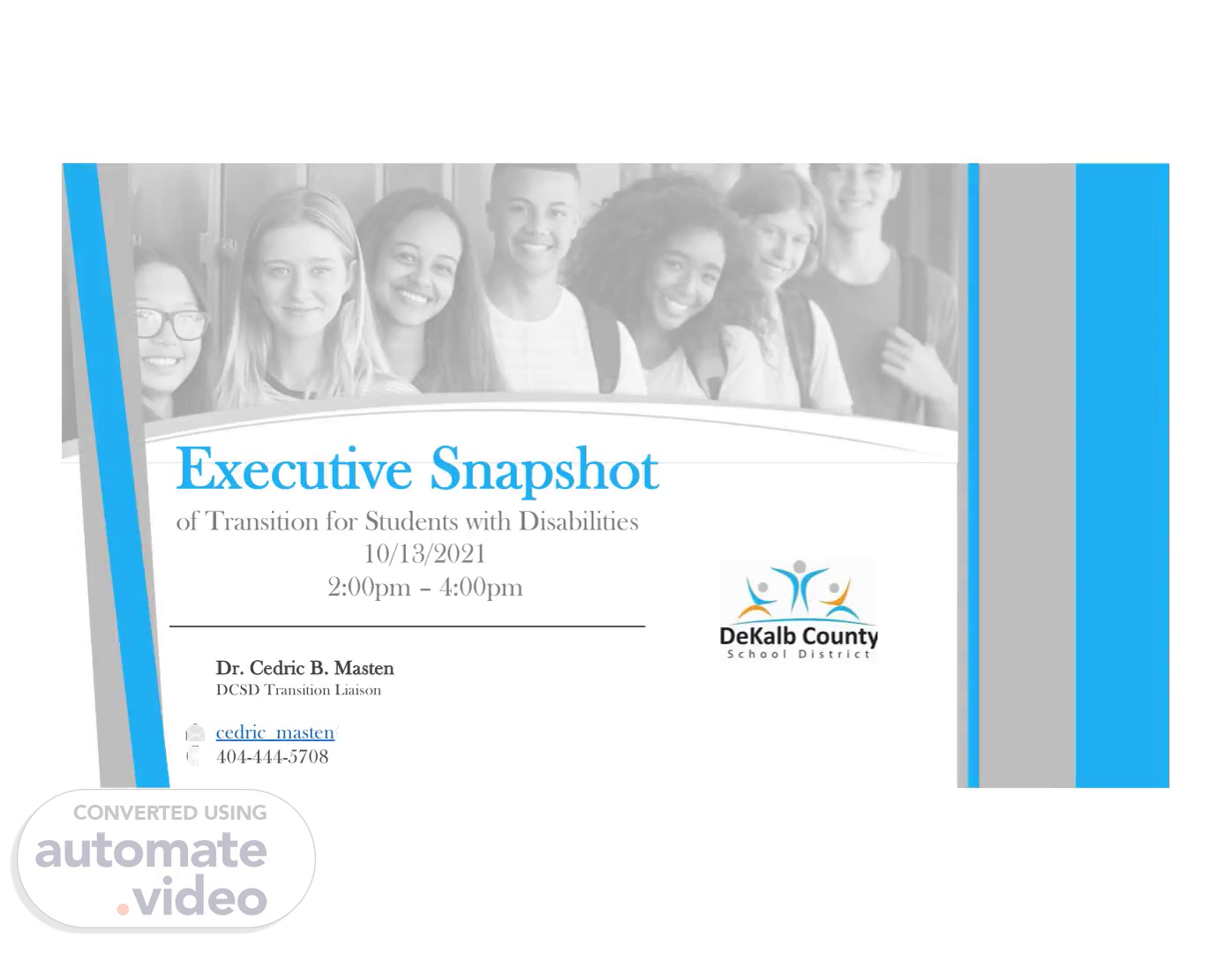
Page 1 (0s)
. . . . Executive Snapshot. of Transition for Students with Disabilities.
Page 2 (12s)
. . . Transition Liaison Dr. Cedric Masten Cedric masten@dekalbschoolsga.org District Mobile: 678-4'»6843 Ms. Pamela Tucker-Gorden Pamela District Mobile: 678-516*B5 Mrs. Gail Mitchell Gail mitchelll@dekalbschoolsga.org District Mobile: 678-7778197 Mrs. Jennifer Jennifer District Mobile: 678-776-7926 Mr. John Norwood John 678-516-9522 Dr. Linda Buck, Cwdinator Linda buck@dekalbschtNlsga.org 678-676-1920 Assigned High Schools *'uthwest DeKalb High School Redan High Sci•ml Dunwoody High MLK, Jr. High Clarkston High %hml Stone Mountain High School Towers High School Columbia Hi Lithonia High School Miller Grove High School Druid Hills High Transition Class Lakeside High Chamblee High Schml Tucker High *hwl Pro Search Stephenson High School McNair High School Cedar Grove High School Mar aret Harris Center Assigned Middle Schools Redan Middle Schnl ChaRl Hill Middle %hool Peachtree Middle Salem Middle Schml Freedom Middle Stone Mountain Middle %hool Bethune Middle Columbia Middle Lithonia Middle School Miller Grove Middle Schwl Druid Hills Middle Henderson Middle Chamblee Middle School Tucker Middle Stephenson Middle McNair Middle Schml Cedar Grove Middle School.
Page 3 (1m 10s)
. . Training Targets. . . 02. Ø Explore DCSD Secondary Transition in a Standards Aligned System.
Page 4 (1m 32s)
. . . Secondary Transition in a Standards Aligned System.
Page 5 (2m 22s)
. . . What is a legal defensible I.E.P.?. For school leaders and special education decision-makers, it is imperative to develop and enforce an IEP-building protocol that effectively addresses students’ distinct needs while also remaining legally defensible. Consistency is not only critical, but necessary, as weakness in even one section could place a school in a precarious position regarding compliance with the law..
Page 6 (2m 50s)
. . . What is Transition Planning?. • Facilitates the movement from school to post- school activities.
Page 7 (3m 14s)
. . . When is transition discussed?. • A Transition Plan must be developed by age 16 or in the 8th grade, whichever comes first. The earliest age a transition plan can be developed is age 14..
Page 8 (3m 43s)
. . . Supporting transition in high school. Everything is related to transition.
Page 9 (4m 13s)
. . . The law: Idea. • Students must attend or the teacher must take steps to ensure student’s preferences and interests are considered when developing the transition plan.
Page 10 (4m 39s)
. . Purpose &Process of Transition Planning. Create a snapshot of where the student is “transitionally” speaking. List assessments, preferences and interests,.
Page 11 (5m 2s)
. . . The goal of the transition assessment. • Help identify......
Page 12 (5m 16s)
. . Assessing Transition Needs. . • Georgia Milestone.
Page 13 (5m 39s)
. . . Informal assessments. • Transition Questionnaires/Inventories.
Page 14 (5m 56s)
. . . Example of formal assessments. • Georgia College 411.
Page 15 (6m 5s)
. . . Dekalb’s transition plan. Transition so Plan.
Page 16 (6m 12s)
. . . Top section Preferences section. Preferences, Strengths and Interests based on age Appropriate Transition Assessments and Present Levels of Performance.
Page 17 (6m 28s)
. . . Why is the preferences section important?. • Creates a snapshot of where the student is currently.
Page 18 (6m 56s)
. . . Annual transition goals. nual transition goals rig stl.
Page 19 (7m 24s)
. . . Tips for writing annual transition goals. • Should be developed according to the needs of the student for that particular year.
Page 20 (8m 4s)
. . . Transition activities. • Steps that help students reach the annual goals.
Page 21 (8m 27s)
. . . Education and training. • Goals in this area are related to a student’s progress in school and course of study.
Page 22 (8m 58s)
. . . Development of employment. Goals in this area are related to what the student will do to develop employment skills or increase his/her knowledge of careers and employment.
Page 23 (9m 39s)
. . . Community participation goals. Related to what the student will do to increase involvement in the community as a productive citizen in society.
Page 24 (10m 15s)
. . . Adult living. Address skills that students still need to learn/practice in order to become a successful, independent adult.
Page 25 (10m 53s)
. . . Related services. Related to what the student and parents will do to access or gain services that will be needed post- graduation..
Page 26 (11m 23s)
. . . Daily living skills. Related to what the student will do to increase independence in daily aspects of life (typically used for low-incidence population).
Page 27 (11m 43s)
. . Monitoring Progress in Transition. . Best Practices in Transition with parents about activities Documentation at they are responsible for • 0102 o' 04.
Page 28 (11m 59s)
. . . Monitoring progress. • Include the transition plan when you note progress on the IEP..
Page 29 (12m 19s)
. . . Important transition tips. • Make every effort to ensure that the students take an active role in the transition planning process – attending the IEP meeting and taking an active role during the meeting..
Page 30 (12m 39s)
. . . Resources for transition. • www.gadoe.org (curriculum, special education, select a subject: transition to post-secondary.
Page 31 (12m 55s)
. . Questions Dekalb County;. . Questions.